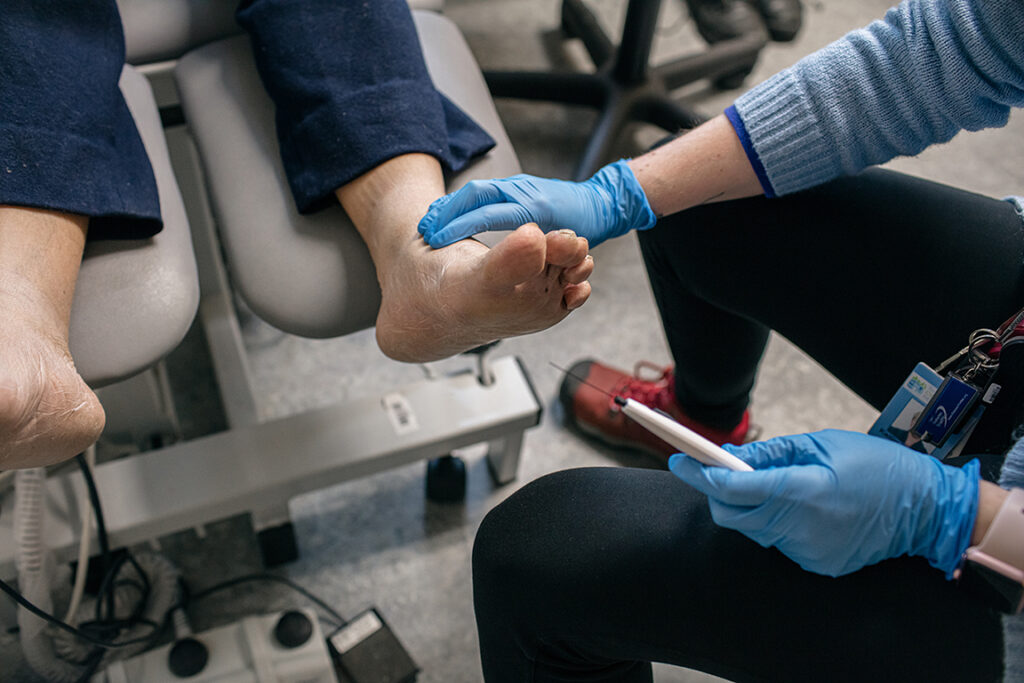Regional Partnerships – Collaboration & Coordination
There are 25 Diabetes Education Programs (DEPs) located within Toronto Region. TDCC has been helping to coordinate shared work and collaboration amongst programs via facilitating regular meetings and communications.
Current areas of focus include:
- The development of a framework to capture complexity of clients who access the DEPs and the care provided by DEP teams
- Improving access to foot care services for clients accessing DEPs
As the work advances, TDCC will provide support with implementation, spread and scale of these initiatives.

Diabetes Foot Health Spotlight:
Advancing Lower Limb Preservation Through Integrated, Equitable Care
People with diabetes face a 15–25% lifetime risk of developing a foot ulcer. Without timely intervention, these ulcers can lead to severe infections and eventual amputation. The consequences are life-altering: loss of mobility, reduced quality of life, depression, increased risk of premature death, and high system costs. Lower limb amputations are largely preventable but continue to occur disproportionately among individuals facing poverty, housing instability, substance use, and systemic barriers to care.
Effective lower limb preservation care involves:
- Prevention & Self-management education
- Routine screening & early identification
- Equitable access to foot care services
- Clear escalation of care pathways
- Wound care and monitoring
Integration of these services offered across sectors is crucial to ensure people are able to access the right care, with the right person, at the right time.
Collaborating Across Systems
In 2024–2025, TDCC supported and led initiatives focused on preventing lower limb amputations among people living with diabetes—a critical and growing concern for the health system and people we serve. We are working closely with system partners to address access gaps by supporting the development and implementation of integrated lower limb preservation care pathways. TDCC has played an active role in supporting regional and OHT foot health initiatives, including:
Regional DEP Leaders Foot Care Working Group
This group has been formed to explore barriers to accessing foot and wound care for people living with diabetes who are accessing Diabetes Education Programs (DEPs). Group members include chiropodists, diabetes nurse educators and program leaders working together across organizations. The group is making progress towards completing an updated current state analysis to map available services and escalation of care pathways, to better understand barriers to equitable access to foot and wound care services for people at highest risk and capture the lower limb saving care being provided across the region.
Downtown East OHT Lower Limb Preservation Integrated Care Pathway
With funding from OH, under the leadership of the DET-OHT, partners have been brought together to design and implement a lower limb preservation integrated care pathway. An evidence-informed simplified foot screening tool was developed and mapped to escalation of care pathways. Referral pathways to community chiropody clinics and tertiary clinics at St. Michael’s Hospital have been established, ensuring access to the right care at the right time. Primary care providers and diabetes educators have been supported to use the simplified screening tool and navigate referral pathways.
East Toronto Health Partners BPSO OHT – Implementing the Diabetic foot ulcers: Prevention, assessment and management Best Practice Guideline
East Toronto Health Partners became a Best Practice Spotlight Organization OHT in 2019. In a BPSO OHT, the OHT partners with the RNAO to implement best practice guidelines. In 2024, the OHT selected the Diabetic foot ulcers: Prevention, assessment and management Best Practice Guideline for implementation, with South Riverdale CHC and Spectrum Health Care leading the implementation within their organizations.

